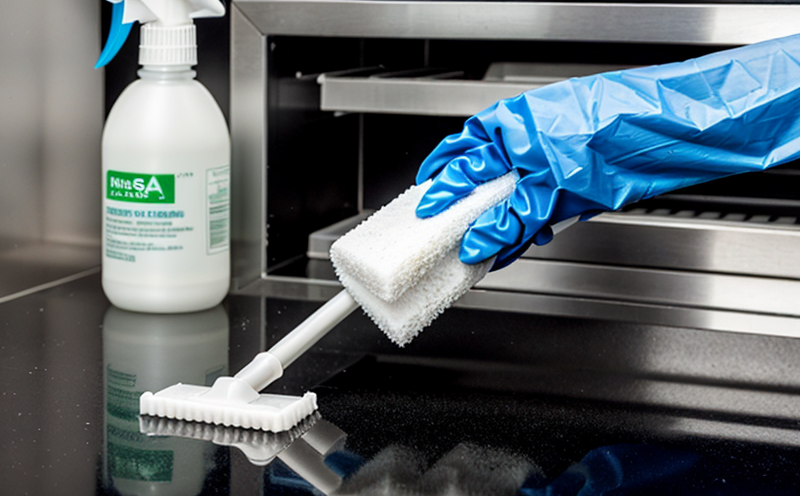ISO 17664 Reprocessing Testing of Plastic Hygiene Devices
The ISO 17664 standard provides essential guidelines for the reprocessing and recycling of plastic hygiene devices, ensuring their safe reuse in healthcare settings. This service is critical in maintaining hygiene standards and regulatory compliance while minimizing environmental impact.
Reprocessing involves cleaning, disinfecting, packaging, and preparing used single-use medical devices to be reused after thorough sterilization. These devices include items like catheters, intravenous (IV) sets, and other plastic components that come into contact with bodily fluids. The ISO 17664 standard ensures these reprocessed plastics meet the same stringent safety criteria as virgin materials.
The process begins with proper specimen preparation, which involves collecting representative samples of reprocessed devices. These samples are then subjected to various tests to ensure they do not compromise hygiene or patient safety during reuse. This includes checking for any potential degradation in material properties due to repeated sterilization processes. The standard also addresses the compatibility of chemicals and cleaning agents used during reprocessing.
The testing process is rigorous, involving multiple stages. Initially, mechanical strength tests are conducted using specialized equipment like universal testers to assess changes in tensile, compressive, or flexural properties after reprocessing cycles. Chemical resistance tests determine if the plastic can withstand exposure to commonly used sterilants without significant degradation. Additionally, microbiological testing ensures no harmful microorganisms remain on the device post-reprocessing.
Material compatibility assessments are crucial as they evaluate whether different plastics used in assemblies will interact unfavorably during reprocessing. This is particularly important for multi-component devices where various materials might come into contact with each other. The standard also covers durability tests, which help identify any potential weakening of the plastic that could lead to failure under repeated use.
By adhering strictly to ISO 17664, laboratories ensure they meet stringent international standards, thereby safeguarding patient health and compliance with regulatory requirements. This service is indispensable for manufacturers aiming to extend the lifecycle of their products while maintaining high levels of hygiene and safety.
- Representative Sampling: Ensures accurate testing by using samples that reflect the entire batch or lot.
- Material Stability: Tests for changes in material properties due to repeated sterilization cycles.
- Chemical Resistance: Evaluates compatibility with cleaning and sterilizing agents used during reprocessing.
- Bacterial Load: Ensures no viable bacteria are present on the device post-reprocessing.
- Material Compatibility: Checks for potential interactions between different materials in multi-component devices.
The ISO 17664 service is vital for industries that produce and reuse medical plastics, ensuring they meet stringent hygiene and safety standards. This testing process guarantees the reliability and effectiveness of reprocessed plastic hygiene devices, making it an indispensable service for quality managers, compliance officers, R&D engineers, and procurement teams.
Why It Matters
The importance of ISO 17664 reprocessing testing cannot be overstated in today’s healthcare environment. With increasing emphasis on reducing medical waste and promoting sustainability, the reprocessing of single-use plastics is becoming more common. However, this practice requires careful oversight to ensure that reprocessed devices do not compromise patient safety or hygiene standards.
Reusing plastic hygiene devices can significantly reduce environmental impact by extending the lifecycle of these materials. This approach aligns with global efforts towards circular economy principles, which advocate for resource efficiency and waste reduction. By adhering to ISO 17664, manufacturers and healthcare facilities ensure that reprocessed plastics meet the same rigorous safety standards as new materials.
The standard addresses several critical aspects of reprocessing, including cleaning effectiveness, disinfection efficacy, compatibility with sterilization methods, and durability under repeated use cycles. These factors are essential to maintaining hygiene and preventing the spread of infections in healthcare settings. Failure to adequately test these parameters could lead to compromised device integrity or increased risk of contamination.
From a regulatory perspective, compliance with ISO 17664 is mandatory for manufacturers seeking to market reprocessed plastic devices globally. Regulatory bodies around the world have adopted this standard as part of their quality assurance frameworks, ensuring that all reprocessed plastics meet international safety and hygiene benchmarks.
The broader implications extend beyond individual organizations; they impact public health outcomes by promoting safer healthcare practices. By adopting ISO 17664 reprocessing testing, institutions contribute to a more sustainable healthcare system while enhancing patient trust through transparent and reliable quality assurance processes.
Benefits
The benefits of ISO 17664 reprocessing testing are manifold, offering significant advantages for manufacturers, healthcare facilities, and the environment. For manufacturers, this service ensures product reliability and regulatory compliance, enhancing brand reputation and market competitiveness. Compliance with international standards not only opens doors to global markets but also builds trust among consumers who value eco-friendly practices.
Healthcare facilities benefit from reduced costs associated with purchasing new single-use devices, as reprocessed plastics provide a cost-effective alternative without sacrificing quality or safety. This approach aligns with broader sustainability goals within the healthcare sector, contributing to more efficient resource utilization and waste management strategies.
From an environmental standpoint, ISO 17664 reprocessing testing promotes circular economy principles by extending the lifecycle of plastic materials used in hygiene devices. By reducing the need for virgin raw materials, this practice helps lower carbon footprints and minimize landfill contributions from discarded single-use plastics. This contributes to a more sustainable future where resources are conserved and waste is minimized.
The service also enhances patient safety by ensuring that reprocessed devices maintain their integrity through rigorous testing protocols. This minimizes the risk of device failure or contamination, thereby protecting patients' health and well-being. By leveraging ISO 17664 standards, healthcare providers can uphold high hygiene standards even when using reused products.
In summary, ISO 17664 reprocessing testing offers a comprehensive solution that benefits manufacturers, healthcare facilities, the environment, and ultimately, patient safety. It fosters a sustainable approach to plastic waste management while ensuring consistent quality across all stages of device lifecycle management.





